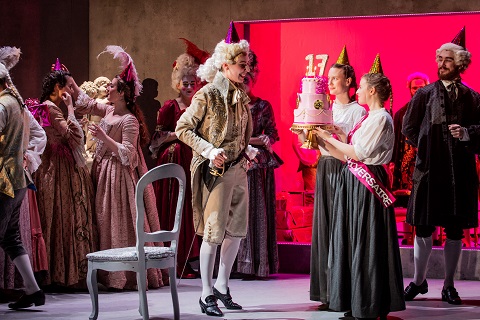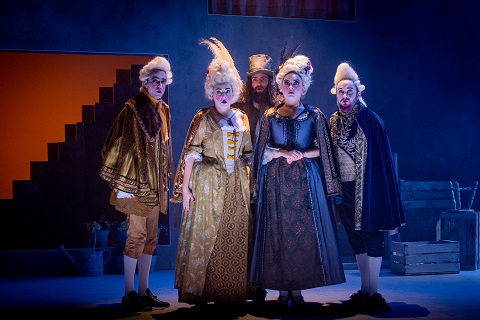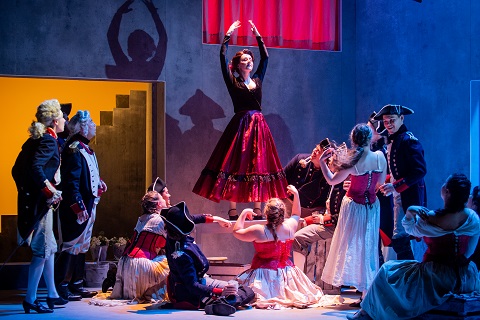
14 Mar 2020
Massenet’s Chérubin charms at Royal Academy Opera
“Non so più cosa son, cosa faccio … Now I’m fire, now I’m ice, any woman makes me change colour, any woman makes me quiver.”
English Touring Opera are delighted to announce a season of lyric monodramas to tour nationally from October to December. The season features music for solo singer and piano by Argento, Britten, Tippett and Shostakovich with a bold and inventive approach to making opera during social distancing.
This tenth of ten Live from London concerts was in fact a recorded live performance from California. It was no less enjoyable for that, and it was also uplifting to learn that this wasn’t in fact the ‘last’ LfL event that we will be able to enjoy, courtesy of VOCES8 and their fellow vocal ensembles (more below …).
Ever since Wigmore Hall announced their superb series of autumn concerts, all streamed live and available free of charge, I’d been looking forward to this song recital by Ian Bostridge and Imogen Cooper.
The Sixteen continues its exploration of Henry Purcell’s Welcome Songs for Charles II. As with Robert King’s pioneering Purcell series begun over thirty years ago for Hyperion, Harry Christophers is recording two Welcome Songs per disc.
Although Stile Antico’s programme article for their Live from London recital introduced their selection from the many treasures of the English Renaissance in the context of the theological debates and upheavals of the Tudor and Elizabethan years, their performance was more evocative of private chamber music than of public liturgy.
In February this year, Albanian soprano Ermonela Jaho made a highly lauded debut recital at Wigmore Hall - a concert which both celebrated Opera Rara’s 50th anniversary and honoured the career of the Italian soprano Rosina Storchio (1872-1945), the star of verismo who created the title roles in Leoncavallo’s La bohème and Zazà, Mascagni’s Lodoletta and Puccini’s Madama Butterfly.
Evidently, face masks don’t stifle appreciative “Bravo!”s. And, reducing audience numbers doesn’t lower the volume of such acclamations. For, the audience at Wigmore Hall gave soprano Elizabeth Llewellyn and pianist Simon Lepper a greatly deserved warm reception and hearty response following this lunchtime recital of late-Romantic song.
Collapsology. Or, perhaps we should use the French word ‘Collapsologie’ because this is a transdisciplinary idea pretty much advocated by a series of French theorists - and apparently, mostly French theorists. It in essence focuses on the imminent collapse of modern society and all its layers - a series of escalating crises on a global scale: environmental, economic, geopolitical, governmental; the list is extensive.
For this week’s Live from London vocal recital we moved from the home of VOCES8, St Anne and St Agnes in the City of London, to Kings Place, where The Sixteen - who have been associate artists at the venue for some time - presented a programme of music and words bound together by the theme of ‘reflection’.
'Such is your divine Disposation that both you excellently understand, and royally entertaine the Exercise of Musicke.’
Amongst an avalanche of new Mahler recordings appearing at the moment (Das Lied von der Erde seems to be the most favoured, with three) this 1991 Mahler Second from the 2nd Kassel MahlerFest is one of the more interesting releases.
‘And there was war in heaven: Michael and his angels fought against the dragon; and the dragon fought and his angels, And prevailed not; neither was their place found any more in heaven … that old serpent … Satan, which deceiveth the whole world: he was cast out into the earth, and his angels were cast out with him.’
If there is one myth, it seems believed by some people today, that probably needs shattering it is that post-war recordings or performances of Wagner operas were always of exceptional quality. This 1949 Hamburg Tristan und Isolde is one of those recordings - though quite who is to blame for its many problems takes quite some unearthing.
There was never any doubt that the fifth of the twelve Met Stars Live in Concert broadcasts was going to be a palpably intense and vivid event, as well as a musically stunning and theatrically enervating experience.
‘Love’ was the theme for this Live from London performance by Apollo5. Given the complexity and diversity of that human emotion, and Apollo5’s reputation for versatility and diverse repertoire, ranging from Renaissance choral music to jazz, from contemporary classical works to popular song, it was no surprise that their programme spanned 500 years and several musical styles.
The Academy of St Martin in the Fields have titled their autumn series of eight concerts - which are taking place at 5pm and 7.30pm on two Saturdays each month at their home venue in Trafalgar Square, and being filmed for streaming the following Thursday - ‘re:connect’.
The London Symphony Orchestra opened their Autumn 2020 season with a homage to Oliver Knussen, who died at the age of 66 in July 2018. The programme traced a national musical lineage through the twentieth century, from Britten to Knussen, on to Mark-Anthony Turnage, and entwining the LSO and Rattle too.
With the Live from London digital vocal festival entering the second half of the series, the festival’s host, VOCES8, returned to their home at St Annes and St Agnes in the City of London to present a sequence of ‘Choral Dances’ - vocal music inspired by dance, embracing diverse genres from the Renaissance madrigal to swing jazz.
Just a few unison string wriggles from the opening of Mozart’s overture to Le nozze di Figaro are enough to make any opera-lover perch on the edge of their seat, in excited anticipation of the drama in music to come, so there could be no other curtain-raiser for this Gala Concert at the Royal Opera House, the latest instalment from ‘their House’ to ‘our houses’.
"Before the ending of the day, creator of all things, we pray that, with your accustomed mercy, you may watch over us."

“Non so più cosa son, cosa faccio … Now I’m fire, now I’m ice, any woman makes me change colour, any woman makes me quiver.”
Beaumarchais-Mozart’s hyper-sexed adolescent, Cherubino, speaks of love when dreaming, when awake, and even when there’s no one there to hear his radiant romanticising, inspired by burning desires he can neither understand nor control.
In the third of his ‘Figaro plays’, La mère coupable, Beaumarchais’s excitable young page enjoys a night of passion with the Countess Almaviva only for her to suffer pangs of guilt and dismiss her lover, sending him into spiral of depression, derring-do and death. With suicidal recklessness he runs off to battle and is mortally wounded. The Countess reads his dying words of regret and love; shortly after she finds she is pregnant with Cherubino’s child.
French playwright Francis de Croisset had other ideas. Chérubin, the eponymous protagonist of de Croisset’s 1901 ‘Figaro-sequel’ hasn’t changed much since his days spent panting in the Countess’s dressing-room or gallivanting with Barbarina in the nocturnal garden. Now a swaggering, swooning seventeen-year-old in Seville, he is looking forward to celebrating his birthday and his new military commission by inviting countesses, baronesses, the Duke’s mistress and the girl-next-door to his fête galante.
Jules Massenet was charmed by de Croisset’s Chérubin when he saw it at the Théâtre-Français and just two days later he had obtained the rights to the play in order to set it as an opera, which he termed a comedie chante, with the aid of de Croisset and Henri Cain. The resulting rococo confection, which bubbles with playful pastiche and parody, went down well with its first audiences in Monte Carlo in 1905 (the premiere took place, serendipitously, on 14th February), and subsequently was well-received in Paris. Fauré praised its Mozartian spirit and grace.
 Photo credit: Robert Workman.
Photo credit: Robert Workman.
Requiring a large cast, and with copious juicy roles for several female voices, it’s a good choice for a student ensemble, and Royal Academy Opera have frothed up a flighty and frivolous evening of fun. Duels are threatened and diverted. Swords are unsheathed, sensuous serenades sung, and Spanish dances sashayed. Chérubin woos women from dawn to dusk, despite the warnings and guidance issued by his compassionate and wise mentor, The Philosopher.
Director James Hurley and designer April Dalton take a tongue-in-cheek glance towards the eighteenth-century. Period costumes are sumptuous, the rouge is slapstick and the bygone rococo world is filtered through bright modern lights. There’s a touch of Peter Greenaway in the juxtaposition of cool gentility and vibrant excess, as the angled grey walls of Dalton’s set reveal curtained niches of eye-popping hues. At the start, we might be at Orlovsky’s party, if only the large cast’s opportunities for hedonism were not curtailed by the constriction of the design’s small spaces. The back walls, which push the action quite far forward on the Susie Sainsbury Theatre stage, also bounce the sound out into the auditorium with energetic thrust: it’s a busy and boisterous production, and occasionally - for example, in the moonlight episodes of the second act - a little more contrast of light and shadow, laughter and serenity, might have been welcome.
However, these are minor misgivings. This second-night, second-cast performance was a delight of musical nostalgia, affectionate whimsey and charm. Massenet clearly enjoyed himself composing this opera and so the singers and musicians relished performing his exuberant score. Though, conductor Anthony Legge (currently Interim Head of Opera) didn’t obviously evince the lilt and grace of French comedy, he ran a tight ship and his instrumentalists played with terrific precision and verve. There were some lovely woodwind colours and plenty of Spanish flavour. Legge didn’t seem to give the singers much attention or guidance, but, then, they didn’t seem to need it.
 Grace-Marie Wyatt (L’Ensoleillad). Photo credit: Robert Workman.
Grace-Marie Wyatt (L’Ensoleillad). Photo credit: Robert Workman.
The three principal soprano roles were well differentiated and engagingly characterised. In the title role, Lithuanian mezzo-soprano Gabrielė Kupšytė glowed with dizzying charm and puppyish enthusiasm, by turns frisky, petulant and introspective. Kupšytė displayed gamine grace as the would-be Casanova, chest puffed out in faux-mature posturing. A thwarted opportunity for sword display resulted in a fit of pique and melancholy: Mozart’s young page seemed hardly to have ‘grown up’ at all. Infectiously ‘love-drunk’, Kupšytė’s first aria, ‘Je suis gris! Je suis ivre!’, dazzled with a lovely sheen and thrilling bloom, but there was moving and tender sincerity when the confused young lover asks The Philosopher to explain why the merest thought of a woman so inflames his heart with uncontrollable passion. Bass Ossian Huskinson was a strong, dignified presence as The Philosopher, displaying a warm, generous tone, and sonorously sharing his wisdom with his charge.
As the Spanish dancer, Ensoleillad, Grace-Marie Wyatt used the plush layers and fruity lower range of her soprano to show us why she had ensnared the Duke’s heart. Sensuous and impetuous, this Ensoleillad enjoyed the favours and admiration bestowed upon her but kept a cool head when required. Her aubade, ‘Vive amour qui rêve, embrasse, et fuit’, was beautiful, and Chérubin - still reeling from the heady scents of the sweet love-duet that they sang at the end of Act 2 - would have done well to heed her words: “Long live love that dreams, blazes and flees,/ Long live love that dies in one night.”
Samantha Quillish impressed in all three of RAO’s 2019 productions, most especially in the title role of Tchaikovsky’s Iolanta , and here she was outstanding as Nina, the ‘nice girl’ whom Chérubin overlooks as he chases his aristocratic darlings. Her act 1 aria was a lovely moment of simplicity and stillness amid the revelry and carousing, and in the final act - a sombre figure in black, as Nina prepares to enter a convent - she sustained a sense of sincerity when things took a sentimental turn.
In the comprimario roles of The Count and The Baron, James Geidt and Dan D’Souza were convincingly patrician and urbane, while Camilla Harris (The Countess) and Elspeth Marrow (The Baroness) were mischievously entertaining as two bored aristocrats in search of some fun. Maxwell Levy (Capitain Ricardo), Andrew Johnston (The Innkeeper), Peter Harris (The Duke) and Connor Baiano (Officer) made up the fine cast, and there was lively support from the 24-strong chorus who nimbly negotiated the steps, stairs and niches of the set.
When a rare moment of common sense throws Chérubin into Nina’s arms and the young lovers creep away, Massenet and his librettist have one last laugh. As Ricardo and The Philosopher wryly identify them as ‘Don Juan’ and ‘Donna Elvira’, the orchestra strikes up ‘Deh vieni alla finestra’. Will Nina become just one of the ‘mille e tre’ seduced Spaniards in Chérubin’s catalogue of conquests? It’s hard to believe: Massenet’s music is too sweetly sentimental, surely?
The esteemed nineteenth-century critic and scholar, Adolphe Jullien, an early admirer of Massenet, summed up the composer’s allure: ‘On leaving the theatre when this froth of sound has subsided, one feels a trifle embarrassed at having allowed one’s self to be carried away; and if one wishes to probe to the core this dazzling, shimmering music, it is easy to see that there is in it little substance and novelty. But when the curtain goes up again we promptly come under its spell once more, and again we feel the lively attractiveness of this fresh and sparkling music. A great magician in truth, is the composer of Chérubin.’
This production certainly sparkled with the spirit of make believe and held us under its spell.
Claire Seymour
Massenet: Chérubin
Chérubin - Gabrielė Kupšytė, L’Ensoleillad - Grace-Marie Wyatt, Nina - Samantha Quillish, La Comtesse - Camilla Harris, La Baronne - Elspeth Marrow, Le Philosophe - Ossian Huskinson, Le Comte - James Geidt, Le Baron - Dan D’Souza, Le Capitaine Ricardo - Maxwell Levy, L’Aubergiste - Andrew Johnston, Le Duc - Petter Harris, Un Officier - Connor Baiano; Director - James Hurley, Conductor - Anthony Legge, Designer - April Dalton, Lighting Designer - Ben Pickersgill, Movement Director - Victoria Newlyn, Royal Academy Chorus and Sinfonia.
Susie Sainsbury Theatre, Royal Academy of Music, London; Thursday 12th March 2020.